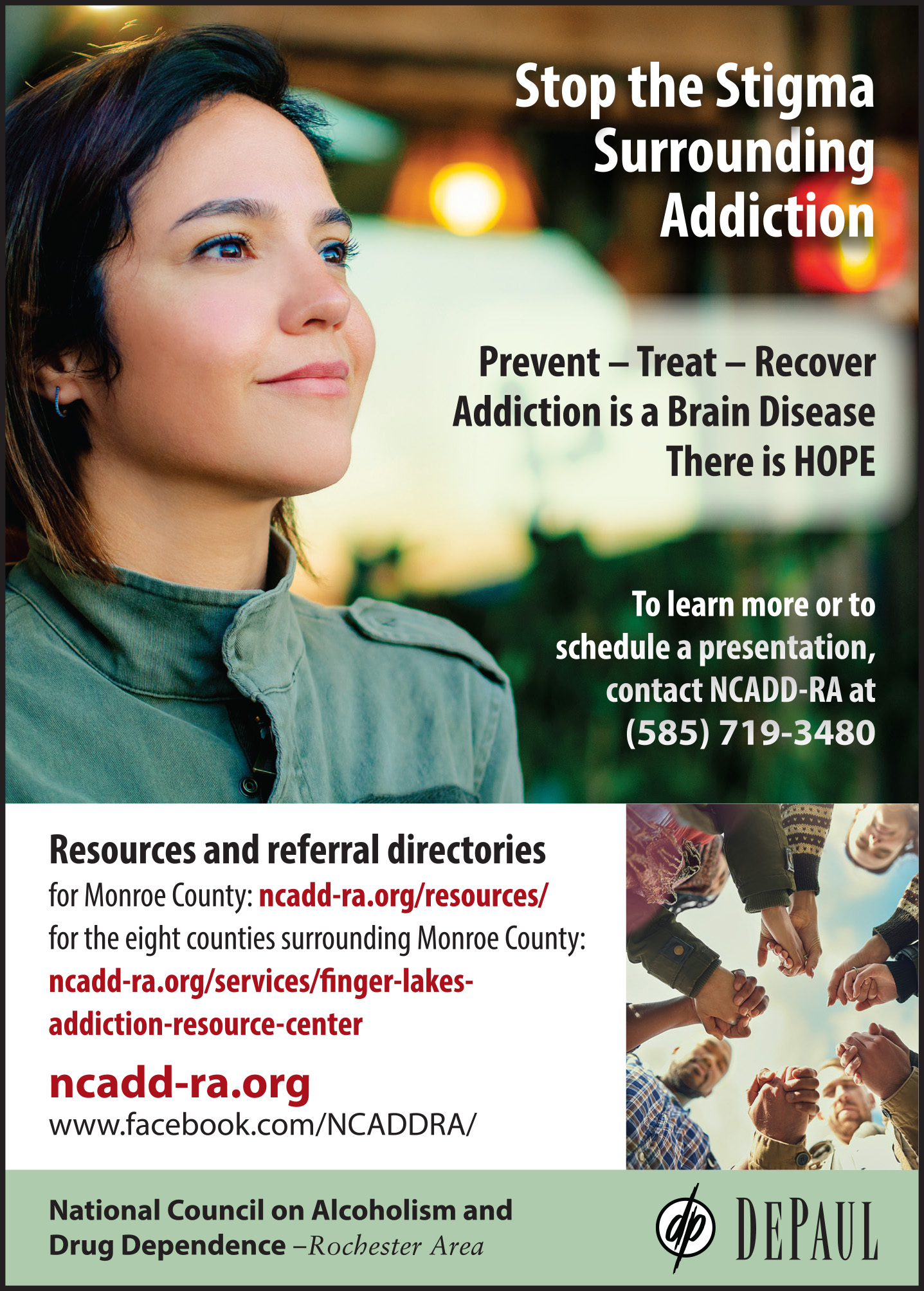Fostering a Culture of Prevention and Celebrating a Climate of Recovery: Where to Go to Seek Help for Addiction

By Jennifer Faringer, MS Ed, CPP-G, Director of the National Council on Alcoholism and Drug Dependence – Rochester Area (NCADD-RA)
Addiction is a brain disease rather than simply a “bad behavior” and so much more complex than “just say no” media campaigns of the past.
The American Society of Addiction Medicine defines addiction as “a treatable, chronic medical disease involving complex interactions among brain circuits, genetics, the environments, and an individual’s life experiences. People with addiction use substances or engage in behaviors that become compulsive and often continue despite harmful consequences. Prevention efforts and treatment approaches for addiction are generally as successful as those for other chronic diseases.”
Yet the disease of addiction and those impacted by it continue to be stigmatized. Stigma is labeling people as disgraceful or unworthy secondary to a perceived flaw or negative characteristic. It results in shame for the individual and their families. Shame becomes a barrier that prevents one from seeking help, support, resources and treatment. We can increase the likelihood that those affected will seek help by having important conversations and eliminating the use of stigmatizing language.
Fostering a culture of prevention and celebrating a climate of recovery begins by ensuring individuals and families seeking support are treated as promptly and respectfully as patients who are seeking help for diseases like diabetes, heart disease and others. Research shows that a successful approach must include an emphasis on proactively providing prevention education and support services at both the community and school-based levels for families and young people impacted by addiction.
The National Council on Alcoholism and Drug Dependence – Rochester Area (NCADD-RA) is working to erase stigma and make it possible for individuals struggling with addictions and those impacted by the addiction of their loved ones to get help and support in a variety of ways.
The long-standing Total Approach Family Program offers education and support groups for parents and youth, helping them to understand the nature of the disease, reassuring them that they are not alone, and fostering a healthy family system. Additionally, NCADD-RA offers Triple P (Positive Parenting Program) parent discussion groups. Triple P is offered in both Spanish and English, for parents and/or adult caregivers. More information may be found at: https://ncadd-ra.org/services/total-approach-family-program/. Prevention efforts also include community presentations and professional education to empower change and offer support.
The NCADD-RA maintains a variety of Treatment Provider Directories as well as a Directory of Recovery Services for Monroe County and Genesee/Orleans/Wyoming Counties, Livingston/Ontario/Yates Counties, and Seneca and Wayne Counties. Treatment Directories include names of agencies, points of contact, websites, addresses, levels of care, insurance accepted, and much more. Recovery Directories include a description of services and activities provided by groups who support individuals at any stage of recovery through sober communities. Other resources include Medication Assisted Treatment (MAT) providers, Problem Gambling Services, Drug Testing sites, and much more.
Monroe County resources may be found at https://ncadd-ra.org/resources/.
Additional resources may be found at the Finger Lakes Addiction Resource Center at https://ncadd-ra.org/services/finger-lakes-addiction-resource-center/.
NCADD-RA reaches out to the community through education, community awareness, health and resource fairs, encouraging safe disposal of unwanted medications, providing safe disposal pouches and medication lock boxes, as well as fentanyl test strips and Narcan, a medication used to reverse overdoses.
To learn more about addiction-related topics visit our website at www.ncadd-ra.org/resources/awareness campaigns/.
To request a community presentation on a variety of addiction-related topics visit https://ncadd-ra.org/services/community-presentations/.
Working together we can truly foster a culture of prevention and celebrate a climate of recovery in our community!